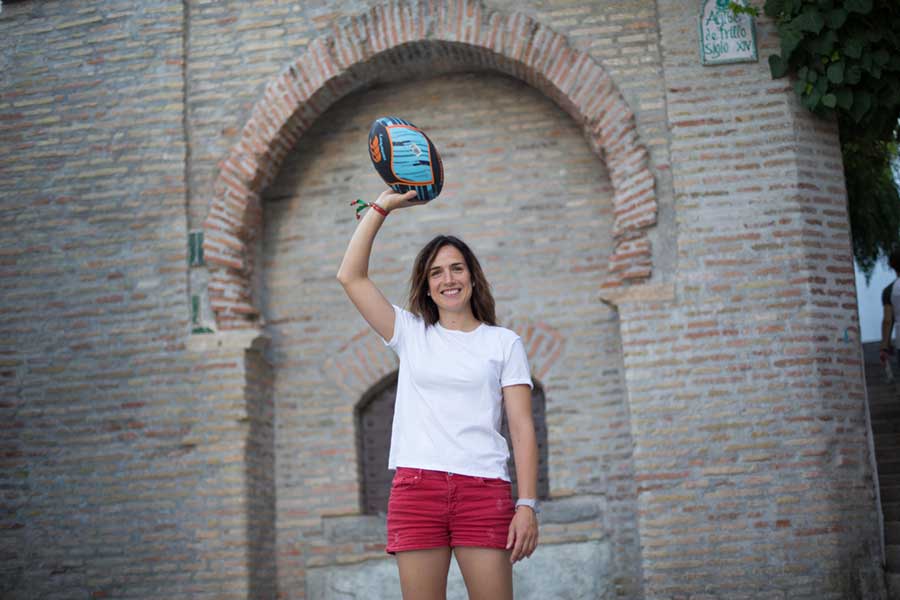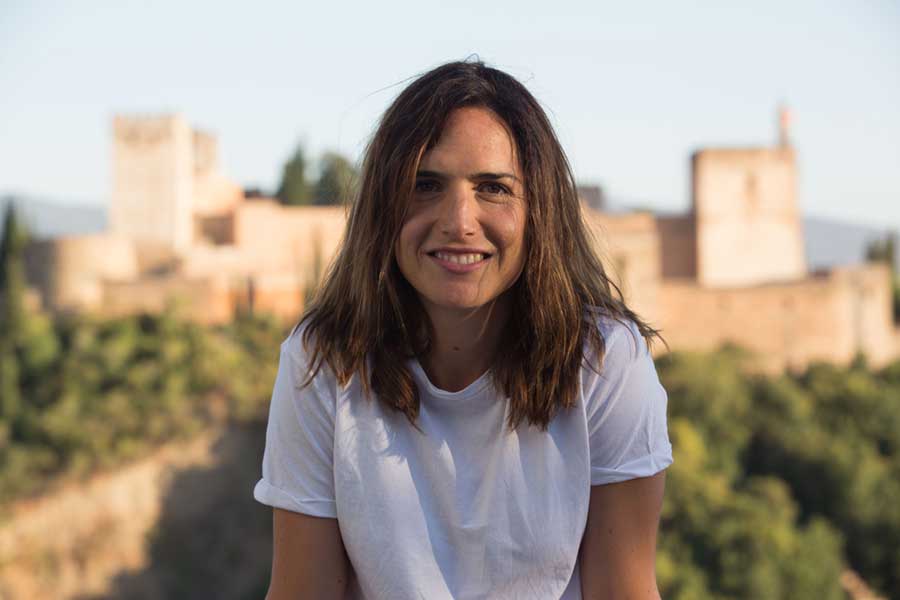“Rugby improves every life it touches”
Alhambra Nievas (Granada, 1983) has seen rugby change her life as much as three times. The first one when, after having tried different sports, she started to play it at the Universidad de Málaga, where she got a Telecommunications Engineering degree. The second one came when she took on refereeing, starting a blazing career that took her to be nominated as the 2016 World’s Best Referee. She was in charge of the Olympic Rugby Final at Rio 2016 and, more recently, became the first woman to ever referee an international Test Match between men’s national sides. This last episode has labelled her as a trail-blazer, a pioneer to look up to… She understands the impact but for a few nuances, which aim at this idea: normalization of a true equity amongst persons. Alhambra will be one of our speakers at the De los Pies a la Cabeza multiconference events.

- You always say: “Our society needs more rugby”. Why is that?
- We live in turmoil. The world has become more and more competitive and less human. We produce to consume but so easily forgetting everything around us. We forget there are other persons who might need our help; and we all should allow others to help us. Rugby was born as an amateur sport. And although it became eventually professional, it still holds its essential genuine values: respect, solidarity, team work… I find all that very suitable to business or even education environments. We demand our kids to get the best school qualifications but often forget to instill in them some values that are really necessary.
- You name team work: that has become a motto in our society.
- In rugby you can have the best world player but does not assure you’re going to be the best team and win trophies. That makes you aware of the need to complement with others and adjust to them, listen to their opinions, give up your perspective in order to achieve a common goal… this is all natural. In Málaga we always have this motto: “I am because we all are”. We are what we are because we are a part of something far more important than the individual.
- There is another relevant value in rugby: respect for the opposition and the referee.
- Fist time my grandfather saw me refereeing a game he said to me: “Hey, this guys don’t even squeak at what you say…”. I find this should be the usual thing: there’s something definitely wrong with us when respect for a decision becomes so exceptional and there is no agressive attitude towards it. Rugby is an example of that: players, espectators, coaches… they all understand that you need the ref to play a game. So you want to treat him or her respectfully and talk to each other with empathy.
- Empathy is another concept very much necessary in today’s society.
- Rugby cares for that empathy, favouring a relationship amongst equals. This works for referees as well: we need to keep the required authority and be able to put ourselves at the same level as players, never above them. Having a law book and a whistle shouldn’t change that. Rugby people take care of this approach both inside the pitch as well as outside of it.
- At the end of the day we are talking about assertive communication.
- That’s it. Say what you think, but do it in the best possible way. The tone changes the way the person in front is going to take it. Depending on that it might work or not.
- They say Alhambra Nievas is breaking barriers. How do you see it yourself?
- I have never done anything to be the first one. It has all been a natural consequence of the process of doing things, just that. I can understand that being the first puts some responsability on your back, makes you a pioneer. But even though I am aware I have made a contribution to open new grounds, it has never been in my mind. I did it just naturally.
- “Everything I do -as Javier Hernández says in his appearances- I do it because it can be done, not to be a hero”.
- The more natural things are, the less we will look at how different it is if a man or a woman do them. And the more equal we will be. I will be doing myself equal to others if I believe that everything I do comes out of work, not gender. True… it helps to bring down some walls, and I feel happy about that for it gives more people and opportunity. That is important: more people has to walk that new path, otherwise it makes no sense.
- You don’t have more merit because you are
- Many people tell me: “Being a woman you hold a bigger merit”. But I think that is a way to treat you differently, not as an equal. Why should I be given more merit than a fellow man who does exactly the same thing that I do? I don’t like when I’m given that kind of merit: I do it as a person and I deliver as a person. I don’t want merit just for being a woman.
- Here is another parallel to our message: doing everything with everybody… that brings real equality.
- I can understand how people react, but I was raised seeing my mom and dad do the same things. It wasn’t a case of my mom cooking lunch and my daddy fixing the car… No. So for me there was never any surprise in a girl refereeing a match. In rugby, girls and boys play along in the same sides until 16 years old. There are girls who captain their teams and hold important positions in the squad… that makes the whole thing completely normal for them. The less differences we underline, the more real equity we will achieve.
- It is a long road towards true equality…
- People tell me: “You are where you are because you’re a woman”. And I think: well… and what about the work behind it? At the end of the day, it is work which takes you places. Without work, discipline, perseverance… being a woman is of no use. This is positive discrimination seen as a negative thing: you take off the value in what a woman achieves. Luckily, people come to realise that without work and quality in what you do, you get nothing: doesn’t matter if you’re a woman, a man or… a horse.
- We so often look at a person, but don’t see the person.
- It is so common today to label everything, just for the sake of making it different. Take the men’s match between Finland and Norway I refereed: to me that was just natural, just like any other game. I can understand the hype but… why? In that way, we are not treating everybody as equals. You are not treating me the same as a fellow man referee that has just done Norway v Switzerland. This may be necessary for some time, but we are obsessed to stress the peculiar side of things just for the sake of it. Hey… we are just persons! That’s all. There is no difference whatsoever in refereeing men or women. No difference at all. It is rugby, end of the story. Why do we enjoy the difference so much?
- Is rugby a naturally inclusive game?
- Everybody has a place in rugby. Everybody has a value, may it be a sports value or a social value. And that comes with the fact that no matter what your body is like, you’re gonna suit a particular position on the field, your skills will match the others and will be mirrored outside the pitch. This is of great value in a society increasingly competitive, a society which is always willing to tell you what to do. That is why everybody who arrives at rugby, wishes to stay.
- Everybody gets engaged into it, or so they say…
- I strongly believe that rugby improves every life it touches. I haven’t found such an experience in any other sport I’ve tried: rugby enhances you, gives you social skills.. I know of many difficult lives who have found a much more possitive hopeful way through rugby.

